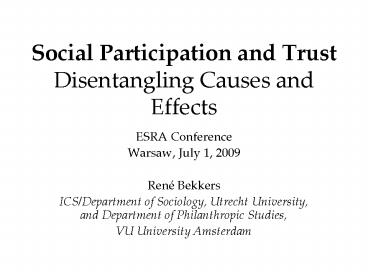Social Participation and Trust Disentangling Causes and Effects - PowerPoint PPT Presentation
1 / 23
Title:
Social Participation and Trust Disentangling Causes and Effects
Description:
ICS/Department of Sociology, Utrecht University, and Department of Philanthropic ... Interactionism' in personality and social psychology ... – PowerPoint PPT presentation
Number of Views:67
Avg rating:3.0/5.0
Title: Social Participation and Trust Disentangling Causes and Effects
1
Social Participation and Trust Disentangling
Causes and Effects
- ESRA Conference
- Warsaw, July 1, 2009
- René Bekkers
- ICS/Department of Sociology, Utrecht University,
and Department of Philanthropic Studies, - VU University Amsterdam
2
Virtuous circles in social capital
- Civic engagement and trust are mutually
reinforcing - The causal arrows among civic involvement, ..
and social trust are as tangled as well-tossed
spaghetti - Robert D. Putnam (2000). Bowling Alone The
Collapse and Revival of American Community. New
York Simon Schuster, page 137
3
Theories on causation
- Group socialization theory
- People adopt the values of the groups that they
are in (family, church, work) - Social capital (attitude) formation
- Self-perception theory
- People adapt their values and self-identity to
their behavior - Role identity theory volunteer role identity is
reinforced through volunteering
4
The evidence is thin
- Brehm Rahn (1997) reciprocal influences
between trust and membership - Uslaner (2002) results obtained through 2SLS not
robust over different specifications - Delhey Newton (2003) trust and membership are
only weakly correlated in most countries - Claibourn Martin (2000) no effect of changes
in memberships on changes in trust - Smith (1966) and Stolle (2003) we need panel data
5
A theory on selection for trust
- Interactionism in personality and social
psychology - Individual differences in trust shape perceptions
of contributions to collective goods - Failures to contribute by others are noise to
trustors evidence for misanthropists - Justification-effects reinforce prior differences
in trust
6
As a result
- Trustors are more likely to start volunteering,
and less likely to quit - Misanthropists are less likely to start
volunteering, and more likely to quit - Trustors may become more trusting and
misanthropists may become less trusting as a
result of changes in volunteering
7
Its all about selection!
- BTW, note also
- Individuals with larger networks are more likely
to be asked to start and continue volunteering - Individuals in better (mental) health are more
able to continue volunteering - More happy/satisfied individuals are more likely
to help others (and be helped in return)
8
Causation theories
- Group socialization theory
- People adopt the values of the groups that they
are in (family, church, work) - Social capital (attitude) formation
- Self-perception theory
- People adapt their values and self-identity to
their behavior - Role identity theory volunteer role identity is
reinforced through volunteering
9
Hypotheses tested in this paper
- Stability hypothesis no effects at all
- Contextual diversity hypothesis trust grows only
interactions in diverse groups - Group socialization hypothesis trust grows only
interactions in trusting groups - Intensity of engagement hypothesis trust grows
only if a lot of time is invested
10
Main Data and Measures
- Giving in the Netherlands Panel Survey, 2002-2006
(nt11,946 nt1..21,246 nt1..3 692 nt1..4
562) - Structural equation model of trust
- Changes in trust after joining, quitting, or
sustaining volunteer work 2002-2008 - Trust average score (1-5) for Most people can
be trusted You cant be too careful in
dealing with other people (r .46) - Volunteering extensive method-area module
11
Adequate Testing, Please!
- Cross-sectional data are useless here
- We need longitudinal data to disentangle causes
and consequences of voluntary participation - We should look at how people change over time
when they have started and quit volunteering - Halaby (2004, Annual Review of Sociology)
controlling for Yt-1 is not enough - Use fixed effects regression models, eliminating
variance between individuals - XT in STATA
12
Development of generalized social trust (most
people can be trusted)
13
Stability of Trust
14
Changes in trust
15
Volunteering effects on values
Estimates on effects of volunteering (m40) from
random and fixed effects regression models.
Source GINPS, 2002-2008 (n5,690 3,248
unbalanced panel)
Little causation (31 max.)
16
Reinforcement effects
In addition, no support whatsoever for contextual
diversity hypothesis
17
Effects of trust on volunteering
18
The British Household Panel Study
- A sample of about 10,000 UK citizens is
(re)interviewed every year since 1991 - Data used from wave 6 (1996) to 15 (2005)
- 6,040 respondents completed wave 14 out of 9,032
wave 6 respondents (66.9) - Trust declined from 37.1 in 1998 to 31.1 in
2005
19
Participation effects on trust
Estimates on effects of membership (m55.6),
activity (47.0) and volunteering (20.6) from
random and fixed effects logistic regression
models of trust. Source BHPS, 1996-2004
(n17,646 5,354). Work in progress.
Some causation (37 max.)
20
Evidence from Switzerland
Estimates on effects of passive membership
(m27.8), active membership (33.0) and
volunteering (20.6) from random and fixed
effects logistic regression models of trust.
Source Swiss Household Panel, 2002-2007
(n39,030 and 11,752 20,620 and 7,451)
No significant causation
21
Effects on life satisfaction
Estimates on effects of passive membership
(m27.8), active membership (33.0) and
volunteering (20.6) from random and fixed
effects regression models of life satisfaction.
Source Swiss Household Panel, 2002-2007
(n39,030 and 11,752 20,620 and 7,451)
Some causation, both negative and positive
22
Selection, Mostly
- Relationship of volunteering with trust is
primarily due to selection, not causation - More trusting individuals are more likely to be
asked to start volunteering, are more likely to
do so, and are less likely to quit - Joining or quitting the volunteer work force
hardly change peoples trust - Trust is very stable over a period of 4 years
(.78)
23
Thank you, says
Rene Bekkers, Head of Research, Department of
Philanthropic Studies, VU University
Amsterdam R.Bekkers_at_fsw.vu.nl www.giving.nl

